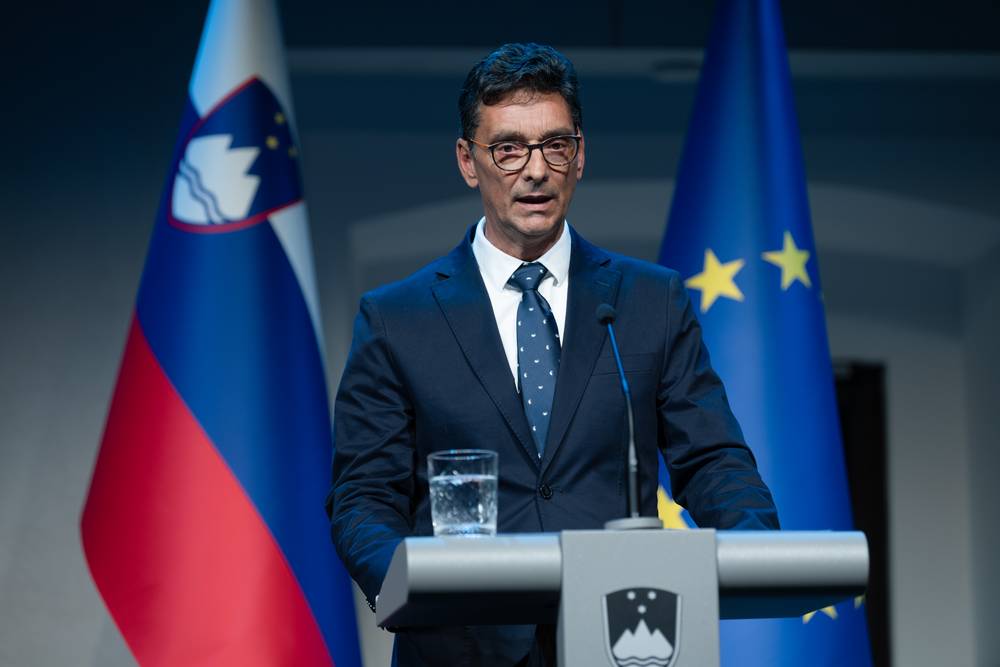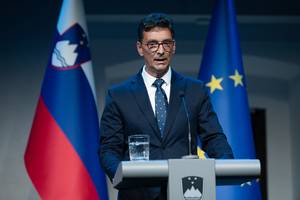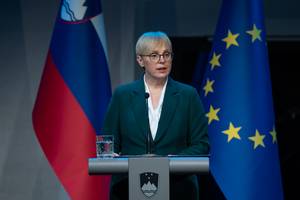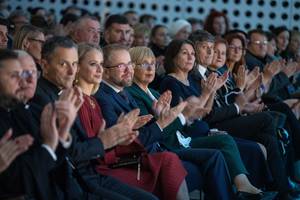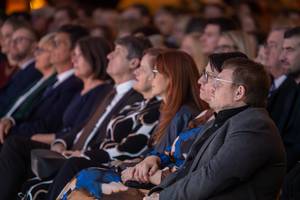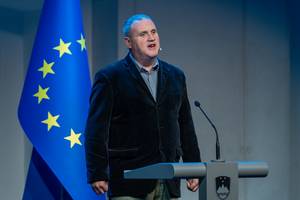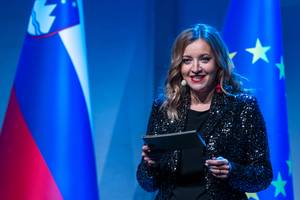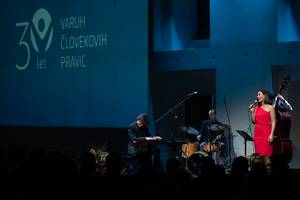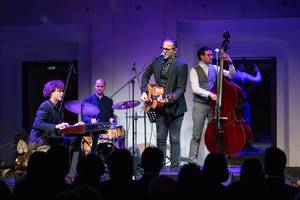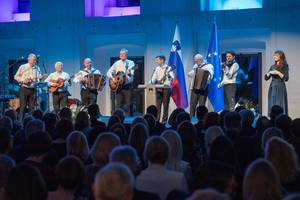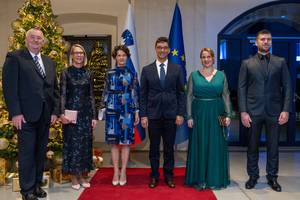Today, we are celebrating an extraordinary day – the upcoming International Human Rights Day, and the 30th anniversary of the Ombudsman of the Republic of Slovenia. We celebrate the efforts not only of our institution, but of everyone who sincerely strives for a better tomorrow. Not just for ourselves, but for the whole community.
In the last thirty years, we have witnessed global events that have had a major impact on security, stability, and solidarity. We are still witnessing them. Violence, conflicts, radicalisms, populisms, health disasters, and ecological and environmental threats, these all remind us how destructive we can be and how very vulnerable humanity is. However, we also know that it is possible to learn from our mistakes, as well as knowing from good experiences that we can control bad ones. Therefore, we know that it is possible to build a more just, community-based, and safer future with trust, dialogue, and community thinking.
We Slovenians prove this all the time. We are building our country, we are part of the European Union, we have developed advanced technologies, raised the standard of respect for human rights and achieved an enviable level of prosperity alongside a welfare state. Although we know how to be extremely community-based, we have too often neglected many on this path towards progress. For example, even for those who take care of the individual and the community – medical personnel, social care workers, teachers, educators and thousands who perform noble and important work, their income is still below the minimum wage. Despite the fact that they are fully employed, these important workers do not have enough resources for a decent life. Although we often talk about standards and norms and agree that decent payment is necessary for the work done, in practice we often cannot find a solution. It is the same in many other areas. We condemn hate speech and talk about the importance of ethics of public speech, but we still easily stir up hatred in our communities, we do not condemn incitement, non-acceptance, stigmatisation, or discrimination. In spite of this lack of condemnation, we have nothing against disabled people, migrants, Roma people, prisoners, or others... As long as they are far away from us and our children.
Maybe some of you also have the feeling that egocentricity and collective narcissism are trying to take root in us, but I firmly believe that most of us know and are aware that we belong to a community that is predominantly good, humane, understanding, and believes in unity. We have already proven so many times that we can be a socially responsible community that cares about the well-being of others. We know that we are, and can be, a society that creates a positive social climate with joint efforts. A society where the rights of individuals are not undermined, the values of tolerance not destroyed, where each member is treated with respect and dignity. For this to happen, we do not need a revolution, but only a firm and decisive commitment to the common good.
In 30 years, our institution has dealt with almost 88,000[1] cases of people who turned to us because the authorities overlooked and neglected them or interfered with their rights and freedoms. We have answered almost twice as many calls and letters, held a huge number of personal conversations and, together with the National Preventive Mechanism, made several thousand recommendations. All these many people are from our community. Those in charge did not notice their plight. Furthermore, the rules-makers and implementers, who are supposed to act fairly, responsibly, and in the public interest, these people did not know, were unable or unwilling to listen to them, when asserting their rights. If they had, we wouldn’t have dealt with so many cases.
You know, I recently came across a record of the late first human rights ombudsman, mag. Ivan Bizjak. As early as 1995, he identified unreasonably long and complicated decision-making procedures, avoidance of decision-making, unequal treatment, and ineffective supervision in the work of the authorities. If I add to this list the lack of explanation of duties and arrogance, I can, unfortunately, say that I have identified the same bad practices as mag. Ivan Bizjak, 30 years on. The violation of the principle of good governance is still one of the most common violations of human rights today. And it will persist until we as a society recognise that human rights are not a luxury, but the foundation of every democratic and legal state. This violations will continue whilst we see that the people who turn to us are not just numbers, applications, forms and other documents that we get on the table, but real people who need and deserve our help.
Any violation is inadmissible, it is too much. This is why tonight, as so many times before, I repeat my appeal and expectation that the country should carefully consider the recommendations, warnings, and suggestions of the institution of the Ombudsman. With this, it will not only give a clear sign of how it behaves towards the institutions of democracy, but will also prove to the population that it cares about everyone and that it wants to correct the injustices it has caused. I believe that is the only way we can progress as a society.
The culture of dialogue is the basis of a democratic and pluralistic society in which trust reigns. Where co-operation is not a one-way street, but an alliance. Where everyone is aware of their responsibility for common progress. Where actions count, not words and promises, but our activation in practice. In co-operation and dialogue, which are the key building blocks of justice, we can create a better tomorrow here and now. Without dialogue and justice, phrases such as human rights, democracy and the rule of law risk becoming mere phrases, devoid of meaning.
May the celebration this evening be an inspiration to us. An inspiration for philanthropic action. For strength and courage in recognising and correcting injustices in our communities. To oppose hostility, intolerance, discrimination, and disrespect. We are not yet a just society, there is a lot of inequality in our environment, but we are open and big-hearted. This is also why I believe that we can use our wisdom and skills to spread the culture of dialogue. This value, which is increasingly missing for me, is necessary for the search for progress, because we can only encourage good in others with the good in ourselves.
Without a culture of dialogue, we cannot really change society for the better, we cannot implement real changes, if you want reforms that can bring lasting prosperity and progress for all. When I say all, I mean the thousands in queues in our health facilities, thousands without a GP or gynaecologist of their choice; to all those living below the poverty line – who do not have decent wages or pensions; to people with disabilities who face online and physical inaccessibility and other problems that plague them in everyday life; to all children in social hardship; to all young people who have an unsolved housing problem due to wild real estate prices and a lack of non-profit housing; to all the elderly who, despite empty beds, are without adequate care due to personnel problems in homes for the elderly; to all who are imprisoned in institutions due to our lack of understanding of deinstitutionalisation; to all who were affected by last year's floods or face the consequences of climate change differently; to those erased after the independence of Slovenia, for which we cannot find a solution; to all those who are discriminated against on the basis of various personal circumstances, for example religious affiliation, nationality, race, or sexual orientation. In short, to everyone who is one way or another pushed to the edge of society.
Only great people create a great nation. People who give back to a community they can be proud of. And these great people are and can be all of us, respected and revered.
The verses of our greatest poet, Dr. France Prešeren, from Zdravljica, with which the extraordinary Nina Strnad made a wonderful introduction to this evening, "Unity, happiness, reconciliation to us, let them return" are not only a poetic echo of the past, but a call to responsibility for the future. Prešeren's messages are still somewhat relevant today, as they urge us to create a society where diversity will not be a reason for discord, but a source of strength, where dialogue will be a tool for strengthening trust and a more inclusive and just society.
Let me end by thanking everyone who has created and are currently creating the story of the institution of the Human Rights Ombudsman of the Republic of Slovenia. There cannot be a successful institution without a great team, so thank you, dear colleagues, for your expertise and efforts, your drive and energy, your passion and dedication to people in need.
Thank you also to all of you, fellow travellers in this journey for justice, for honouring us with your participation this evening. I'm delighted that we can celebrate together.
I wish you all the best!
[1] [1] 68,516 from 1995 to 2019 + 19,168 mandate of Peter Svetina – data until October 2024
